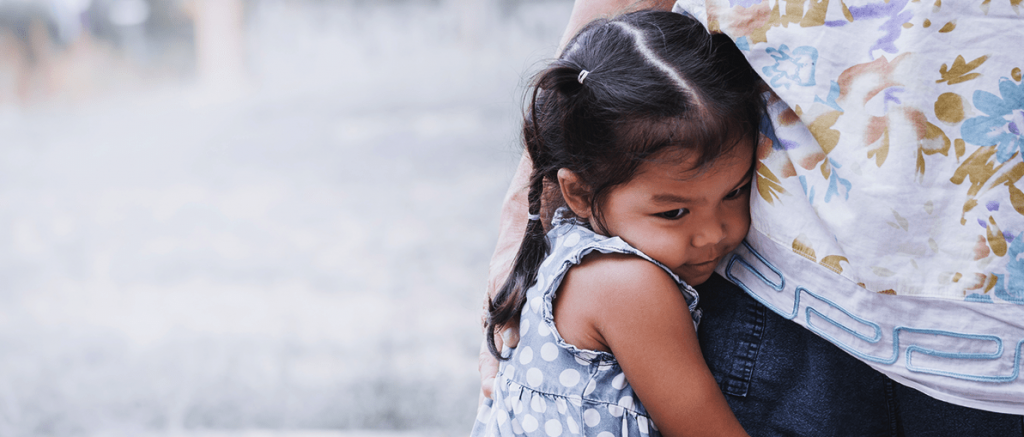
I often tell the families I work with that children don’t come with instruction manuals. As a clinical psychologist who specializes in anxiety, my job is to give parents that manual. In the best of times, that’s not an easy task.
These are not the best of times.
We are facing unprecedented changes and uncertainty—for example, when have schools ever closed for an extended time? We’re all wading into uncharted territory and scrambling to figure it out as we go.

Uncertainty and unpredictability are scary and stressful. As a parent, you may want to shelter your children from that stress, but you can’t. Instead, let’s help them learn how to handle tough things. Here are some helpful suggestions:
—Give them age appropriate information.
Telling a child “don’t worry, everything is fine” is likely to backfire. They can look around and see that things are, in fact, not fine, and their little minds will fill in the blanks, often in really unhelpful ways. Be straight with them with what you can, but don’t overwhelm them with too much information or with speculation. Stick with the facts and be careful not to promise things that you can’t. You don’t know for sure how long this is going to last or if people they know will get sick—and it’s ok to say that.
—That said, limit news and media consumption and coronavirus talk.
Frankly, the news is overwhelming and stressful, and not just for kids. Besides, the more we talk or hear about something, the bigger and scarier it gets. Set aside one or two—at most—times during the day to get updates (from credible sources) so you can stay informed. Outside of that, turn off the news and get off social media and encourage your kids to do the same.

The sense of safety provided by predictable routines is out the window right now. It will be important to create a sense of structure. Therefore:
—Keep bedtimes and wake-up times consistent and add in some kind of schedule.
A free-for-all, glued-to-a-screen situation is not going to be helpful for anyone. The kids and teens I’ve seen this week are worried about more than their routines and schedules changing. They’re worried about being bored, being stuck inside with family constantly, and missing their friends.
Personally, I am worried about the potential impact that these physical health-safety measures are going to take on their mental health and well-being. Humans need certain kinds of activities to feel healthy and happy and to prevent or minimize depression. Specifically, we need activities that are enjoyable, productive, social, and physical. Without school and sports or extracurricular activities, we’re going to have to get creative to meet these needs.
—Implement family activity time in which everyone turns off phones and does something together.
Play a game, watch a movie, cook, do a craft, write letters to grandparents, read a book, dance, go for a walk, play tag. Get creative! And plan ahead.
—Help your child come up with a list of activities to combat boredom and social distancing. Write each on a slip of paper and put them in a bowl. Take turns drawing the activity for the evening.
—Find ways to help your child connect with others, especially for older kids and teens.
Can they do virtual group hangouts or study groups? Create video projects together?

As everyone is cooped up inside and spending more time than usual together, tempers may flare. The added burden of stress and uncertainty is not going to help the situation, so make a point to build in some positivity.
—Make a point to express appreciation and gratitude …
… especially for your kids and other family members. Have your children do it, too. Help your children focus on the things they can do rather than all the things they can’t do right now.
—Have them “flip it.”
When they complain or make a negative statement, tell them to “flip it.” They have to come up with a “but at least” statement. For example, “I’m so bored! I can’t go over to my friend’s house.” Flipped it’s: “But at least it’s sunny today, so I can go outside and play with my brother.” Let your kids prompt you to flip it, too. They’ll be more invested, and it’ll be good for you, too.
—Find a way to help others.
Doing something kind for someone else can be a wonderful way to help combat anxiety, boost happiness, and build important skills like empathy and compassion.

There are important lessons to be had here. Lessons about resiliency and how to cope in the face of uncertainty and adversity. Work on modeling your own good coping skills. (Need some help? Join me for free, live online psychological strength building workshops on Tuesdays and Thursdays at noon. www.peakmindpsychology.com/starter-pack to join.)
For more resources, check out:
Tips for Parents: https://youtu.be/ysB5FhyTXXI
Go Zen: https://gozen.com/coronavirus-anxiety/
Child Mind Institute: https://childmind.org/
—Ashley J. Smith, PhD is a licensed clinical psychologist who specializes in the treatment of anxiety and obsessive compulsive spectrum disorders. She is also the co-founder of Peak Mind: The Center for Psychological Strength.

